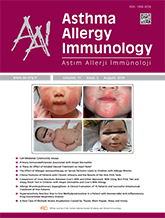


Objective: Periostin, an extracellular matrix protein, is related to the eosinophilic airway inflammation. There is no specific marker in allergen immunotherapy to evaluate clinical response. We aimed to investigate the serum periostin levels in the children who receive allergen immunotherapy.
Materials and Methods: Sixteen patients between 8-18 years (12.7±2.8 years) with allergic rhinitis and/or asthma due to grass pollen hypersensitivity and 30 healthy subjects (11.7±2.6 years) were included. Demographic data, eosinophil counts, skin prick tests and the specific IgE levels of the patients are recorded. Symptom scores, visual analog scales, medication scores were determined and the serum periostin levels were measured in the beginning, 4th and 12th months of the allergen immunotherapy.
Results: The symptom scores for rhinitis in the 4th month showed significant improvements in all of the patients (p<0.05). Nine patients with allergic rhinitis accompanied by asthma, showed significant improvements in 12th month symptom score for asthma (p=0.018). A significant correlation was detected between the initial serum periostin levels and the symptom scores for the eye (r=0.668, p=0.005). No significant difference was found in serum periostin levels between the patient and the control groups. There were no significant differences in serum periostin levels in 4th and 12th months compared to the ones in the beginning.
Conclusion: In this study, there were no significant differences in serum periostin levels of children during the allergen immunotherapy. The association of serum periostin levels with symptom scores for the eye needs to be confirmed in more children with allergic rhinoconjunctivitis.